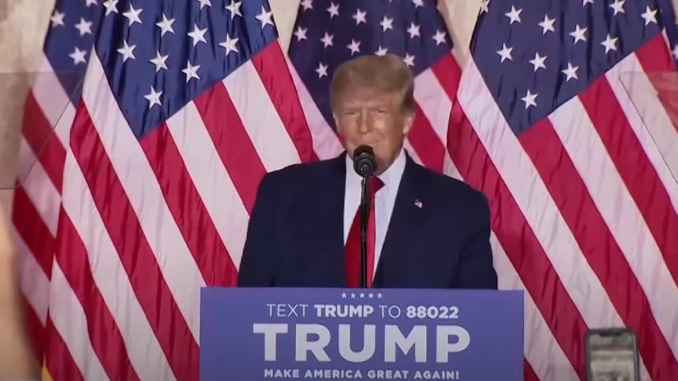
By Donald Jeffries
The Columbia Journalism Review (CJR), a veteran watchdog of the leftist-slanted mainstream media, recently published an article about the news coverage accorded to Donald Trump. Based on an in-depth, 18 month investigation, it found that The New York Times and other major outlets had been unfair to Trump, especially on the ridiculous Russian “collusion” fairy tale.
The investigation was led by former New York Times reporter Jeff Gerth. As CJR’s Editor-in-Chief Kyle Pope stated, “No narrative did more to shape Trump’s relations with the press than Russiagate. The story, which included the Steele dossier and the Mueller report among other totemic moments, resulted in Pulitzer Prizes and embarrassing retractions and damaged careers.”
Shamefully, the Times and The Washington Post shared a Pulitzer Prize for their promotion of a highly fanciful, already discredited theory. Trump predictably called the reporting “fake news,” and has demanded that the Pulitzer board take back the tainted awards.
“In January 2018, for example, The New York Times ignored a publicly available document showing that the FBI’s lead investigator didn’t think, after ten months of inquiry into possible Trump-Russia ties, that there was much there,” Gerth reported. “This omission disserved Times readers. The paper says its reporting was thorough and ‘in line with our editorial standards.’”
Gerth also revealed how the Times’ newsroom was shocked and caught “flat-footed” when special counsel Robert Mueller told Congress that he wouldn’t be pursuing the ouster of Donald Trump. Times Executive Editor Dean Baquet reacted by telling his staff, “Holy s—t. Bob Mueller is not going to do it.”
Gerth continued, “Neither Baquet nor his successor, nor any of the paper’s reporters, would offer anything like a postmortem of the paper’s Trump-Russia saga, unlike the examination the Times did of its coverage before the Iraq War.”
The nation’s “newspaper of record” responded to CJR’s story by standing behind its biased reporting, boasting about all the prizes it had won. The Times claimed to have substantiated its findings with other, unspecified investigations. Presumably with a straight face, the newspaper declared that it had “thoroughly pursued credible claims, fact-checked, edited, and ultimately produced ground-breaking journalism that has proven true time and again.”
Gerth’s report called out the media’s “turbocharged” use of intentionally vague descriptions of anonymous sources like “government official” or “American official,” which the former Times reporter contended were often used “to mask congressional leakers.”
“A few reporters admitted that to me, but, of course, only anonymously,” Gerth noted. “Here’s how it works. First, a federal agency like the CIA or FBI secretly briefs Congress. Then Democrats or Republicans selectively leak snippets. Finally, the story comes out, using vague attribution.”
Former FBI spokesman Mike Kortan told Gerth, “It was a problem for us. We would brief Congress, try and give them a full picture with the negative stuff, and then a member of Congress can cherry-pick the information and the reporter doesn’t know they’ve been cherry-picked.”
CJR’s report emphasized that the Times used the catchall identification “person familiar with” more than 1,000 times in its coverage of the Trump-Russia fairy tale. CJR interviewed Donald Trump two times, and reported that he “remains furious over what he calls the ‘witch hunt’ or ‘hoax’ and remains obsessed with Mueller.” They quoted Trump as saying, “I realized early on I had two jobs. The first was to run the country, and the second was survival. I had to survive: the stories were unbelievably fake.”
Gerth detailed how a Times story that broke only a few days before Trump’s inauguration in January 2017 was headlined “Intercepted Russian Communications Part of Inquiry Into Trump Associates.” Gerth described how the article “evoked a strong reaction from [Peter] Strzok, who was leading the FBI inquiry: ‘no substance and largely wrong,’ he texted, adding that ‘the press is going to undermine its credibility.’”
The Times published another article a month later, with the headline, “Trump Campaign Aides Had Repeated Contacts With Russian Intelligence.” Gerth related how Baquet had called it the “biggest story in years.” But, as Gerth wrote, “The piece did contain a disclaimer up high, noting that their sources, ‘so far,’ had seen ‘no evidence’ of the Trump campaign colluding with the Russians. But in the next paragraph it reported anonymous officials being ‘alarmed’ about the supposed Russian-Trump contacts because they occurred while Trump made his comments in Florida in July 2016 wondering whether Russia could find Hillary’s missing emails.”
CJR exposed the obvious: that the liberal media had aligned against Trump from the beginning of his campaign in 2015, and how journalists worked with Hillary Clinton’s campaign while government officials promoted the bogus Trump-Russia narrative. CJR’s conclusions were backed by independent, left-leaning journalists Glenn Greenwald and Matt Taibbi. Greenwald praised the CJR for exposing “pervasive lying” and “deep corruption.”






Good summation.